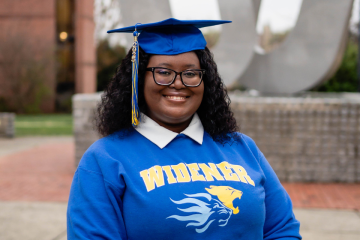Widener Biology Professor Awarded Grant to Develop Online Research Courses during COVID-19 Pandemic

Associate Professor of Biology Janice Krumm has been awarded nearly $200,000 in a National Science Foundation RAPID grant to develop online-based research experiences for hundreds to thousands of undergraduate students learning remotely during the COVID-19 pandemic.
“The COVID-19 pandemic has resulted in a shift to online learning on an unprecedented scale,” Krumm said. “This funding will help mitigate negative impacts on biology education at Widener and other higher education institutions across the country at a time when undergraduate students cannot be in a traditional laboratory or field setting.”
The National Science Foundation is funding dozens of rapid response research projects on COVID-19 to mobilize the scientific community to better understand and develop measures to respond to the virus.
Krumm will lead efforts to bring together undergraduate educators, natural history collections and data professionals, and collections researchers to support the development of course-based undergraduate research experiences using digitized Natural History Collections. Educators and students can gain access to over 121 million specimen records and over 1.4 billion occurrence records on these publicly available data portals.
The lack of access to traditional laboratory resources has resulted in both a challenge and an opportunity. These extensive data resources can provide teaching and research opportunities to undergraduate students and educators that do not require any resources beyond a computer, internet access, and time. — Associate Professor Janice Krumm
Teams will develop teaching materials, course syllabi, and instructor guides and will lead training opportunities to support the implementation of these online research courses at multiple institutions for the 2020-2021 academic year.
Embedding research experiences in biology coursework is especially important for low-income, first-generation, and minority undergraduate students who may be unable to dedicate time to research outside their normal course loads due to personal and financial barriers, Krumm said. This approach is known to increase engagement, retention, and long-term success in undergraduates.
The project accelerates the Biological Collections in Ecology and Evolution Network’s activities and leverages the expertise of its members. The network was formed last year after Krumm and curators from the Delaware Museum of Natural History secured a $75,000 grant from the National Science Foundation.
In the RAPID grant, which totals $198,979, Krumm, the principal investigator, is joined by co-principal investigators Elizabeth Shea, a curator at the Delaware Museum of Natural History, and Carly Jordan, an assistant professor at The George Washington University.



